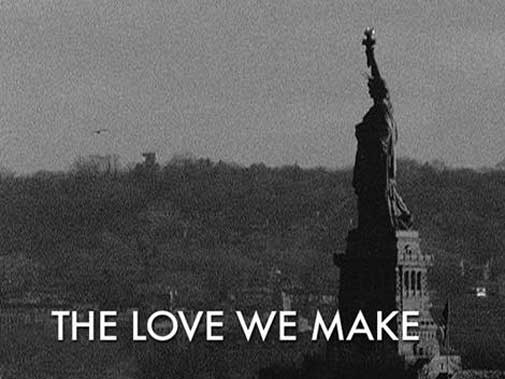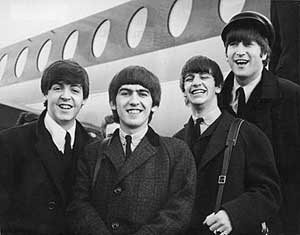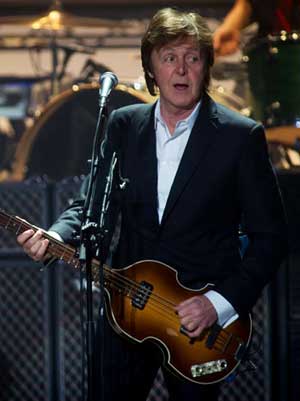
[
Update -- For another, even better account of Paul McCartney's press tour appearance, see Bill Brioux's TV Feeds My Family
dispatch HERE. -- DB]
LOS ANGELES -- On Sept. 10, 2011 -- one day before the 10th anniversary of the 9/11 terrorist attacks -- Showtime will premiere The Love We Make, an Albert Maysles documentary about Paul McCartney's organization and presentation of a post-9/11 show-of-support-for-New-York concert 10 years ago. McCartney appeared via satellite Thursday from Cincinnati, where he was appearing that night in concert, to chat with TV critics about the special. And about the healing power of music, and the news that he apparently is a victim of phone hacking in the British tabloid scandal. And a lot more...

McCartney and Maysles have worked together on a New York-centered, black-and-white TV documentary once before -- for 1964's What's Happening! The Beatles in the USA, which documented the rock group's initial visit to the United States, when they broke TV audience records by appearing on The Ed Sullivan Show and launched Beatlemania worldwide.
"I first met Albert and his brother David," McCartney recalled, "when we came to America, came to New York, and they were filming us." Their manager, Brian Epstein, had been approached by the Maysles brothers with a pitch to film them in a new way: cinema verite.
"Well, we were very big fans of that," McCartney continued. "That was kind of happening in Europe at the same time it was happening in America. So we loved the idea." And when the quartet met the duo, the Maysles brothers sealed the deal when the Beatles asked what the filmmakers wanted them to do. The reply: "We want you to just ignore us."
McCartney smiled widely. "We thought that was the best piece of direction we'd ever received. 'Oh, ignore you? Yeah, we can do that. I can ignore anyone.' So we did, and we just had a great time. And they were right to direct us in that way, because we completely forget they were there. And so the film is very natural. We'd be in our hotel rooms, talking to deejays, talking to each other. And they would just be behind the couch, filming very quietly."
After that collaboration, Albert Maysles, usually in tandem with his brother, went on to create such landmark documentaries as 1968's Monterey Pop, 1970's Gimme Shelter, and 1975's Grey Gardens. McCartney, well, he went on to six more astoundingly creative and influential years with The Beatles, a few years with another little group called Wings, and a solo performing and recording career that continues to this day.

On the day of 9/11 in 2001, McCartney was in a plane on the tarmac in New York, about to fly out of the very city and airport where he had begun the "Beatles invasion" several decades before, when billowing smoke from the Twin Towers prompted that plane, like all others that day, to be grounded. McCartney ended up in a Long Island hotel room, "watching it on TV like the rest of the world."
Immediately, because he was in the city, McCartney began thinking about how he could help -- and thought back to the way his father's generation reacted during and just after WWII.
"I was born in World War II in Liverpool, which was subjected to a lot of bombing," McCartney said. "So I grew up with all these people who'd just recently survived a war, and I noticed how they dealt with it."
McCartney breaks into a few bars of "Roll Out the Barrel," then imitates the sound of explosions.
"While they're getting bombed, they're singing," he said, a hint of admiration in his voice. "So I remembered that, and I thought, 'That's maybe what I can bring to this. Maybe I can just get that kind of feeling, that kind of old courage that I'd seen my parents and their generation exhibit. Maybe I would be able to help America, New York, out of this fearfulness, and that really is what happened."
As that idea was gestating, McCartney had another -- to contact Albert Maysles and have him document the process and the concert.
"So I rang him up: 'Hey, Al, you vaguely interested in doing this?'" McCartney recalled. "I explained what I was going to do, and I said, 'We could just do it all again. You know, I'll ignore you again, and we can make a film."
So the behind-the-scenes footage leading up to the concert was filmed, as was the show itself, which also featured Pete Townshend, Mick Jagger and others. McCartney remembers the audience being very emotional, and the event itself somewhat healing.
"It was a kind of post-fear," he explained. "We were emerging from the fearfulness of the immediate impact, and now you were seeing the emotion releasing through music, which I always think is a great thing. It's one of the reasons I love music and I'm in it.
"You could see, particularly, the firefighters and the volunteers, and their families and victims' families, were able to release this emotion that had been sort of so pent up. So it was a great feeling. It was a really great feeling. We actually felt like we were doing a bit of good."
Yet the footage was never assembled, the documentary never released. But a decade later, McCartney called Maysles again.
"I think the fact of the 10th anniversary spurred me into thinking -- 'Wait a minute. Albert took some great footage back then that we never did anything with.' And it just seemed like it would be a good opportunity. So I got in touch with Albert and said, 'Is it still all around? You know, would it make... a film?'
"And he was very enthusiastic. He said, 'Yeah, it would.' So I said, 'Come on, let's do it, then.' So I think it was reawakened by the 10th anniversary."
And McCartney believes firmly in the documentary's central message: the healing power of music.
"It can bring you to tears," he said. "It can make you smile. It can make you flash back to a memory. You know, people often say, 'Thank you for the music' to me, and say 'It's the soundtrack to my life.'
"So really, it's one of the things I'm most proud of, actually, to have lucked out to be in a profession like this where I can actually help, heal, let people get in touch with their emotions -- and me, by the way, at the same time...
"It's a magical thing, and I do mean that. People say, 'Do you believe in magic, you know, really?' I say, 'Yeah, I really do.' I think I have to."
--
Also, some news:
Asked about his name surfacing recently as an alleged victim of the Rupert Murdoch British newspaper empire's illegal hacking of private phone lines, McCartney confirmed it, but didn't yet know the details -- though he suspects the scandal is even more widespread.
"When I go back after this tour," he explained, "I'm going to talk to the police, because apparently I have been hacked. I don't actually know much about it, but they won't tell anyone except the person themselves. So I will be talking to them about that.
"I don't think it's great. I do think it is a horrendous violation of privacy. And I do think it's been going on a long time, and I do think more people than we know knew about it. But I think I should just listen and hear what the facts are before I comment."